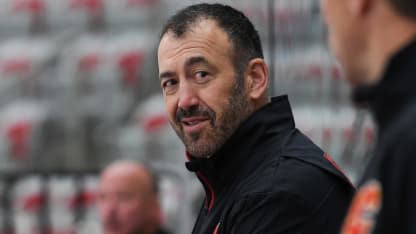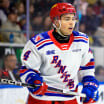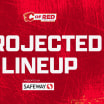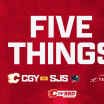"But I've learned so much in the last six, seven years, too. Working with Sheldon Keefe. Drew Bannister. Even in managmeent, working with Kyle Dubas (recently promoted to Toronto Maple Leafs' GM) for a few years.
"These guys are progressive thinkers. They open your eyes and you realize just because we did it this way, this way and this way 'back in the day' doesn't mean it's the only way; that anything is etched in stone.
"As player, I like to think I was able to adapt - there's that word again.
"In junior, I thought I was an offensive guy. All of a sudden you have to be a tough guy. Then you're a powerplay guy. Then a PK/shutdown guy.
"When I played, the game was totally different than what they're teaching now.
"And the reason I was able to have longevity as a player is that I was able to go in the directions the game was headed.
"Same applies to coaching.
"You can't get caught in a time warp."
Having spent the past 15 seasons working the junior ranks in both coaching and management positions, Cirella has joined first-year boss Cail MacLean's staff alongside Domenic Pittis in Stockton with the AHL Heat.
He spent his first year after retiring, '97-98, as an assistant to the late Bryan Murray on the Florida Panthers before moving on to the OHL for an extended run, the last six years as a part of the Sault Ste. Marie Greyhounds.
The gap between pro gigs, then, is a lengthy one.
"It isn't that much different, in my mind,'' says Cirella. "By junior, they're at that first stage of getting the idea of attending a pro camp. A lot of them arrive at our junior camps and we do the same things - orientation, what to expect, bring in some of the older guys to help them get familiar with things.
"They see the difference, that separation, what we tell them they need to do to reach that next level.
"This is no different, just a step up. That's part of what appeals to me about coaching."
Taken fifth-overall by the Colorado Rockies in the 1981 NHL draft (the same year Dale Hawerchuk went No. 1, Ron Francis No. 4, Grant Fuhr No. 8 and a fella by the name of Al MacInnis No. 15), Cirella's NHL career on defence spanned 828 regular-season tilts and another 38 playoff games in the service of a half-dozen franchises, most notably the New Jersey Devils.
While he wasn't one of those who envisioned one day standing behind a bench after the many winters sitting on one, the coaching challenge always intrigued Cirella.
"It's not an easy gig, coaching,'' he says ruefully. "Might not seem that way when you're playing …
"Coaches pour through hours of video to get that one minute clip that illustrates the story you want to tell.
"It's a passion that we have. Everyone that's in it, I think, is in it for the right reason. We all have the same goal. That's what exciting. That, and getting to meet new, interesting people.
"How many times has the emphasis in the game changed in the last 20, 30 years? One day, as a team, you've gotta big and strong. Next day, you've gotta play defence first. Then you've gotta play offence first.
"Being good with the puck is the focal point. But before you know it, you've gotta be better without the puck. Things evolve.
"We're always trying to get better and always trying to think of different ways to achieve the same goal.
"The organizations that can look at things different, can adapt are the ones that have the best chance to be successful.
"I think they're very progressive here. I like the way they communicate. So I'm very excited to be a part of this.
"I just want to help. In any way I can."



















